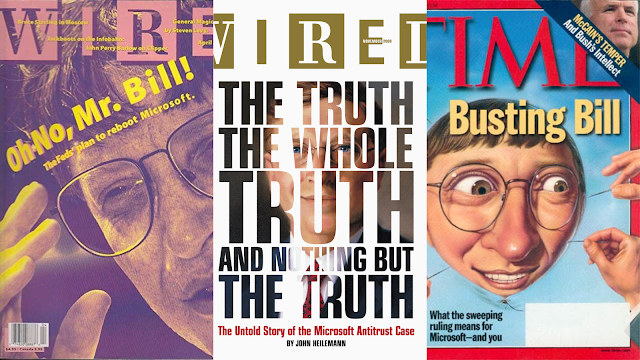Microsoft rivals compete in court, not market
This column first appeared in the North Hills News Record, March 12, 1998.
Minor additions were made to enhance clarity. Keep this history in mind as the current debate over "Big Tech" continues to unfold. In 1998, Apple was barely a blip in the PC market, smart phones didn't exist and the internet was still in its infancy--with no broadband connections. Ten years from now, the "Big Tech" players we want to break up today might very well join AOL, JAVA and MySpace in the trash heap of obsolete technology. Markets aren't perfect. But they're a far better regulator than bureaucrats...
Another pathetic chapter is unfolding in the ongoing saga of the U.S. Justice Department vs. Microsoft.
Bill Gates, founder of Microsoft, played the part of the piñata so a group of pompous senators could take turns whacking him while his whining competitors goaded them on.
Diane Feinstein took to the stand as the self-proclaimed senator for Silicon Valley. But Senator Orrin Hatch of Utah carried the biggest stick.
He blasted Microsoft with a vengeance, accusing the company of monopolizing the software market. Of course, the noble senator has only the consumers' best interest in mind. It must be sheer coincidence that Novell Corporation has headquarters in Utah and Microsoft thoroughly trounced it in the consumer software market.
The executors of this ongoing public whipping believe Microsoft's success is pure luck. They claim the first technology that attracts developers and consumers will have an insurmountable advantage in the marketplace, even over superior rivals that happen to come along.
That means Microsoft's influence in the software market is three parts luck and two parts consumer laziness. To support this, the so-called experts cite the theory of "path dependence," which has its roots in the QWERTY typewriter keyboard.
The QWERTY system, so named for the first six keys on the keyboard, was supposedly designed to slow down the typist so the mechanical keys wouldn't jam.
Years after the QWERTY system was adopted, August Dvorak, a professor at the University of Washington, patented the DVORAK Simplified Keyboard. Dvorak claimed to have experimental evidence that his keyboard could increase the speed of the typist.
The cost of converting typists to the Dvorak system could be recovered through increased typing speed within 10 days of training. But according to the legend, since people already were locked into WERTY, the Dvorak keyboard never caught on. Now, we're supposedly stuck with an inferior design.
This QWERTY tale has appeared in prestigious newspapers such as The New York Times, the Boston Globe and the Washington Post. It even made its way into to successful economics books. And Standford University economist Paul Krugman has said, "In QWERTY worlds, markets can't be trusted."
However, the QWERTY story doesn't make sense. If using the Dvorak system could make a company that much more efficient, why didn't companies convert--especially in the days of typing pools? In the long run, if the new system did what it claimed, many companies could have saved big bucks.
Today, it's simple to reprogram a keyboard to use any configuration, but the QWERTY design is still used. So QWERTY's dominance can't be a freak accident of the market. The truth must be there's not a whole lot of difference between the two keyboards.
Yet, the legend lives on. And Microsoft finds itself in court all the time because of it.
We're not using Microsoft products because of some kind of "path dependence." We're using them because there isn't an alternative good enough to justify switching.
And despite conventional wisdom, Microsoft doesn't dominate the Internet browser market. Netscape does. In database software, Oracle controls 39 percent of the market to Microsoft's 4 percent.
And Sun Microsystem's Java programming language offers the prospect of an alternative to Windows, since applications written in it ca run on any operating system.
Microsoft hasn't gotten where it is by acting like a smug monopolist. It's a brutal competitor. But its competitors have found it's easier to do battle in the courtroom than in the marketplace.



Comments
Post a Comment